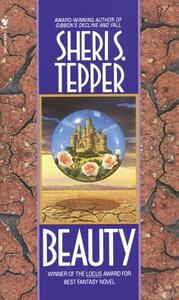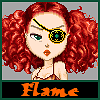Take a photo of a barcode or cover
I didn't like this book at all.
I thought the protagonist too passive, the world too inconsistent and confusing and the theology misplaced. The latter may have been intended by the author, but I did not want it in the book I wanted to read.
This book and I will probably never be friends.
Dull, badly written, glosses over the rape of the main character and somehow manages to be even more depressing in the ending than you would expect!
Read this boo in the mid 1990s. Part fantasy/part sci-fi and encompassing several fairy tales, it was unnerving and dystopian but a mermorable read.
"It seems to me that all beauty is dying. Which makes me hope that perhaps it isn't dead but only sleeping. And that makes me think of Sleeping Beauty and wonder if she might not be a metaphor for what is happening to the world at large: perfect Beauty born, Beauty cursed with death, Beauty dying- but with the magical hope of being reawakened, maybe by love."
Environmentalism, feminism, and all your favorite Disney fairytale characters in one book. I am interested in hearing more people's thoughts on this.
This is a highly undervalued book, garnering very little activity on Goodreads and social media. This book was released in 1991, making the author a visionary in tackling the themes of the environment and women's rights. Still, I can't ignore the lack of diversity in this book.
I fear the author's view of Beauty standards were skewed by the general American perception of the twentieth century and I think it is important to recognize that and bring that to the surface of the conversation. Ironically, the lack of diversity in this book outlines the troubling theme in the world that the author highlights, that Beauty is crushed due to public negligence. I can only hope that Beauty can be alleviated with actions of love.
I give this book 5 stars because it is written beautifully and although I read it months prior to writing this review, I still think about it often. It is imperfect and it is important to know that before cracking the spine of this magical adventure.
Environmentalism, feminism, and all your favorite Disney fairytale characters in one book. I am interested in hearing more people's thoughts on this.
This is a highly undervalued book, garnering very little activity on Goodreads and social media. This book was released in 1991, making the author a visionary in tackling the themes of the environment and women's rights. Still, I can't ignore the lack of diversity in this book.
I fear the author's view of Beauty standards were skewed by the general American perception of the twentieth century and I think it is important to recognize that and bring that to the surface of the conversation. Ironically, the lack of diversity in this book outlines the troubling theme in the world that the author highlights, that Beauty is crushed due to public negligence. I can only hope that Beauty can be alleviated with actions of love.
I give this book 5 stars because it is written beautifully and although I read it months prior to writing this review, I still think about it often. It is imperfect and it is important to know that before cracking the spine of this magical adventure.
I'm so very glad to be finished with this book. It is not horribly written, but nor was it a joy to read. It was based on fairy tales, and sat on my shelf for some twenty-odd years, so I figured I needed to give it a fair shake. I really did want to like it. The writing itself is excellent, but it is incredibly hard to enjoy it much. It's like being hit with a hammer time and time again, the hammer, of course, being Tepper's message. I think I'll stay away from her books from now on.
I can appreciate her message. she's writing about a cause that very much concerns me. The fact that humans overuse, overpopulate, and do not think, or choose to blame anyone but themselves. But the way she goes about telling her message seems to belie her point--that we destroy beauty by our greed and inherent darkness. That we revel in our darkness, and therefore deserve what we get. So she goes on to tell us a horrifically dark story about the death of Beauty. How is that any different from what she is condemning?
Beauty herself is an interesting character, but only vaguely, and it is only the fairy tale parts of her life that truly interested me. I will say that I did enjoy how Tepper manages to set her and her fairy tales into the real historical world in a believable way. The other characters in the story were either blank slates for Beauty to decide how we should feel about them, or so abhorrent as to repel.
Tepper's knowledge is obviously quite good, but she's like the student who stuffs their paper with three times the amount of sources, and repeats their point more times than any teacher would ever think necessary. The imaginary world Beauty finds herself in for a time, for instance. Very much a rationalist construct, but it felt incredibly out of place in this fairy tale-driven story. Though too, so did her time in the present and future. Then there was Tepper's long list of fae and creatures of the fairy realm that she suddenly dumps on us at the very end of the book. Sure, we have met some before that time, but the list seemed to come from nowhere and was entirely unnecessary to the story itself.
The time travel aspect, especially to the dark future that Beauty is dragged to, seems entirely too much. Coming at the point of the story it does, so close to the beginning of her story, it seems only to illustrate her point of "People are bad." Worse, she then goes on to point out how horrible writers are for writing dark things in their stories, thereby causing us to become immured to these horrors. What, then, is her point? Isn't this what she herself is doing? To me, it feels like a rant drawn out far too long, with no true purpose but to scold everyone who will listen.
Read it for the fairy tales if you must, but otherwise, I just wouldn't recommend it.
I can appreciate her message. she's writing about a cause that very much concerns me. The fact that humans overuse, overpopulate, and do not think, or choose to blame anyone but themselves. But the way she goes about telling her message seems to belie her point--that we destroy beauty by our greed and inherent darkness. That we revel in our darkness, and therefore deserve what we get. So she goes on to tell us a horrifically dark story about the death of Beauty. How is that any different from what she is condemning?
Beauty herself is an interesting character, but only vaguely, and it is only the fairy tale parts of her life that truly interested me. I will say that I did enjoy how Tepper manages to set her and her fairy tales into the real historical world in a believable way. The other characters in the story were either blank slates for Beauty to decide how we should feel about them, or so abhorrent as to repel.
Tepper's knowledge is obviously quite good, but she's like the student who stuffs their paper with three times the amount of sources, and repeats their point more times than any teacher would ever think necessary. The imaginary world Beauty finds herself in for a time, for instance. Very much a rationalist construct, but it felt incredibly out of place in this fairy tale-driven story. Though too, so did her time in the present and future. Then there was Tepper's long list of fae and creatures of the fairy realm that she suddenly dumps on us at the very end of the book. Sure, we have met some before that time, but the list seemed to come from nowhere and was entirely unnecessary to the story itself.
The time travel aspect, especially to the dark future that Beauty is dragged to, seems entirely too much. Coming at the point of the story it does, so close to the beginning of her story, it seems only to illustrate her point of "People are bad." Worse, she then goes on to point out how horrible writers are for writing dark things in their stories, thereby causing us to become immured to these horrors. What, then, is her point? Isn't this what she herself is doing? To me, it feels like a rant drawn out far too long, with no true purpose but to scold everyone who will listen.
Read it for the fairy tales if you must, but otherwise, I just wouldn't recommend it.
This book was really weird. The mixture of fairy tales had potential, but overall it felt chaotic and messy.
This book was not subtle. It was two books in one, with one book being the story of Beauty and her enchanted genetic line and another book about man's self-destruction and brutal sins.
The blending of the fairy tales was my favorite part, and I always love Tepper's writing style. I know she felt the heavy-handedness was necessary, and her way of contributing to a small change, but it wasn't fun to read (which is the point).
The blending of the fairy tales was my favorite part, and I always love Tepper's writing style. I know she felt the heavy-handedness was necessary, and her way of contributing to a small change, but it wasn't fun to read (which is the point).
It was a good re=telling of the fairy tale. It's worth a read, but it isn't something I would read repeatedly.
Ugh.
So apparently I wrote a couple of paragraphs about Sherri S. Tepper’s Beauty not too long after I read it. And I just read it and now have no idea where I was going with it.
And the problem is, the indifference, the disinterest. Because with a book you love, it’s so easy to write a gushy, full-throttled love fest. And with a book you hate, it’s also pretty easy to fling it against a wall and rant your head off. But with the indifference, there’s a struggle to move the cursor forward and fill that page. So what happens is that drivel such as this is used instead.
So.
Beauty is the story of well, Beauty, that is, of Sleeping Beauty fame but manages to escape her fate and does some time traveling. There’s some bits in the land of Faerie, the future, and even melds into some other fairy tales. So it pretty much fits the Once Upon A Time categories.
It was an ok read, as you can probably guess by now. It was a little weird, but a little clever how the rest of the fairy tales fit into the bigger story. And there was just a little too much heavy-handedness as Tepper tries to put her agenda across. However, Tepper has some interesting ideas and I’m curious to see what her other books are like. Perhaps more SF and less fairy tale-ish?
Ah the neutral review. Never very interesting to read, is it?
So apparently I wrote a couple of paragraphs about Sherri S. Tepper’s Beauty not too long after I read it. And I just read it and now have no idea where I was going with it.
And the problem is, the indifference, the disinterest. Because with a book you love, it’s so easy to write a gushy, full-throttled love fest. And with a book you hate, it’s also pretty easy to fling it against a wall and rant your head off. But with the indifference, there’s a struggle to move the cursor forward and fill that page. So what happens is that drivel such as this is used instead.
So.
Beauty is the story of well, Beauty, that is, of Sleeping Beauty fame but manages to escape her fate and does some time traveling. There’s some bits in the land of Faerie, the future, and even melds into some other fairy tales. So it pretty much fits the Once Upon A Time categories.
It was an ok read, as you can probably guess by now. It was a little weird, but a little clever how the rest of the fairy tales fit into the bigger story. And there was just a little too much heavy-handedness as Tepper tries to put her agenda across. However, Tepper has some interesting ideas and I’m curious to see what her other books are like. Perhaps more SF and less fairy tale-ish?
Ah the neutral review. Never very interesting to read, is it?







